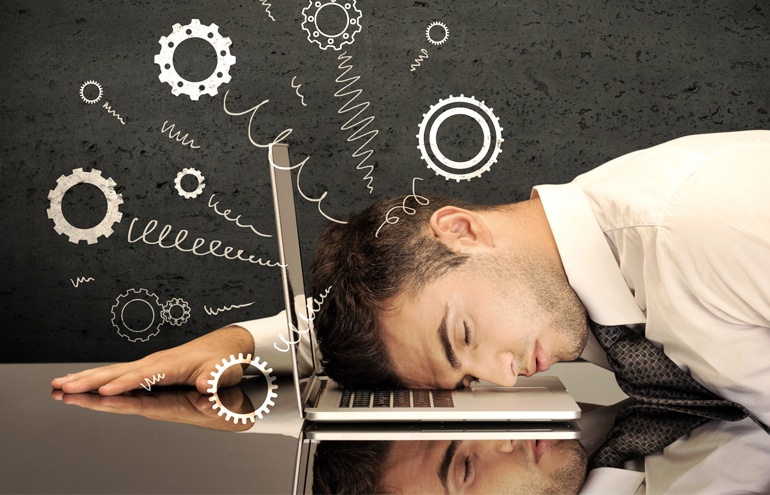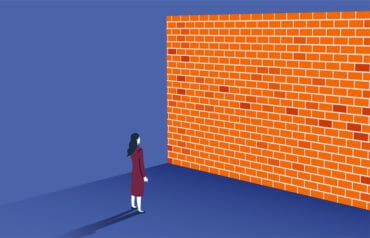For over 20 years I worked past the point of mental and physical exhaustion on a regular basis to rack up the requisite billable hours at a corporate defense firm. Worse, when I finally dragged myself to bed, my brain was still in hyperdrive. I knocked myself out with Tylenol PM and never thought about the health implications of my groggy existence.
Are you so busy juggling your legal career with family life that you log only six hours of sleep and walk around in a zombie-like trance? Do you down mega-doses of caffeine just to keep from nodding off during less-than-scintillating depos?
You probably won’t be surprised to learn that law ranks as the second most sleep-deprived occupation, according to the National Center for Health Statistics.
Rest assured that we attorneys have plenty of company. So much so that the Centers for Disease Control has declared sleep deprivation a public health crisis. One recent study found that 42 percent of the population gets six or fewer hours of shut-eye per night, far short of the seven to eight hours we need to wake up feeling rested. And while you can make up some of the deficit on the weekend, it takes four days to get back to baseline attention skills.
But are you really busier than Jeff Bezos, Arianna Huffington or the CEO of Zappos? These leaders have been very public about making sleep a priority in their lives. Bezos categorizes his eight hours as “non-negotiable,” reasoning that, “If you shortchange your sleep, you might get a couple of extra ‘productive’ hours, but that productivity might be an illusion.”
Sleep is not a luxury. Along with eating a healthy diet and exercising, adequate rest is now recognized as one of the three pillars of health.
The Risks of Too Little Sleep
Here’s the stark reality of what can happen to your health when you continuously scrimp on sleep:
- Your brain doesn’t have time to store new information into memory.
- You gain weight because your hunger hormones don’t reset.
- You can get irritable, impatient, find it difficult to concentrate or have feelings of depression. Sleep and mood are closely connected, says Harvard Medical School.
- You’ll face an increased risk of heart disease and stroke. Research published in the Journal of the American College of Cardiology found that chronic sleep deprivation is associated with atherosclerosis not just in the heart, but throughout the body.
- The likelihood of suffering from a number of diseases including diabetes and cancer increases.
- You may also be at greater risk of developing Alzheimer’s disease. A 2018 study found that sleep deprivation increased beta-amyloid buildup, one of the hallmarks of this fatal brain disease.
- You’ll have a weaker immune system and may catch more viruses.
Power Through or Power Nap?
Now that you know the price we pay for cheating shut-eye, you might just decide to create a nap room in your office. It may sound a little odd, but you’d be right in sync with companies like Ben & Jerry’s, Zappos, Nike and Google, all of which have created quiet rooms to encourage their employees to take 20-minute power naps.
Seven Tips for Better Sleep
Use these tips to do better in the sleep arena:
- Set a bedtime and stick to it. If you need a reminder, set an alarm in your cellphone.
- Develop a wind-down routine that works for you and allocate the time each night. Yours may be drinking a cup of tea, indulging in a warm bath, reading a book, listening to music, or watching a mindless Netflix show.
- If your brain is still a whirlwind of ideas and worries, write down your thoughts and purge them from your synapses.
- Turn off your tech toys and put them away for the evening.
- Understand that your body likes routines. It will function best if you go to bed and get up at the same time every day.
- An optimal sleep environment is a cool, quiet, dark room.
- If all else fails, and you just can’t pull it off, squeeze in a 20-minute nap the next day.
You Might Also Like …
“Why Are You at the Office Until 10 p.m.?”
“How to Be Productive When You’re Depressed”
Illustration ©iStockPhoto.com
Subscribe to Attorney at Work
Get really good ideas every day for your law practice: Subscribe to the Daily Dispatch (it’s free). Follow us on Twitter @attnyatwork.

















